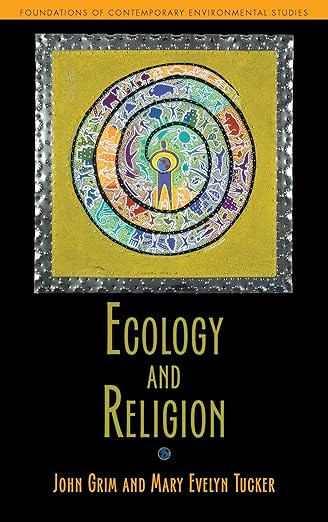What is Spiritual Ecology?
A Few Key Reading Suggestions and Concepts to Consider
I’ve had more than a few people ask me about the study of Religion, Ecology, and Spirituality (my PhD field) and what all it entails. While working on a paper today, I turned back to this piece from Mary Evelyn Tucker titled Why the World Needs Spiritual Ecology and was reminded of how good of an intro to the field of Religion and Ecology it happens to be. So, for those of you curious about Religion and Ecology (and why this project is called Carolina Ecology), you should start here…
If we are to end the era of hyperindividualism, we will need new ways to reform, reshape, and reinvent community. Spiritual ecology is part of this re-creation of being and belonging in a world that is unraveling. It involves processes of recognizing our embodiment in matter through the process of evolution across deep time, our resonance with kin across species, and our reweaving of awe into our mind-body being. Does this upset or reset our sense of place and purpose? Let’s hope so. Otherwise, we risk the steady slump into meaninglessness and ennui.
Tucker is also the co-author with John Grim on the seminal work Ecology and Religion that would, alongside the incredible work of Thomas Berry, establish the field as a course of study as well as provide a framework for what would become the Yale Forum on Religion and Ecology and lead to programs like my own at the California Institute of Integral Studies.
At its heart, the field starts with a single, far-reaching intuition: the fate of the Earth and the fate of the human spirit are entwined. Mary Evelyn Tucker calls it “a path toward reintegration” that can “lift us back into alignment with life, living systems, and the healing power of relationality.”
We are living in what scholars now call a polycrisis… overlapping wars, social unraveling, and climate shocks that feed an epidemic of eco-anxiety. Tucker argues that information alone cannot mend the tears in our cultural and ecological fabric. Spiritual ecology adds practices of awe, grief, and covenant so that action grows from belonging rather than exhaustion.
Core insights of Religion and Ecology
Earth is alive and we are kin. From deep-time stardust to coastal wetlands, every atom in our bodies participates in a 14-billion-year story. When we feel that continuity, the line between “nature” and “us” dissolves.
Wonder is an ethic. Tucker’s panelists in the article above remind us that marveling at mycorrhizal networks or migrating warblers is not escapism… it is the soil in which responsibility grows.
Many traditions… one conversation. Indigenous ceremonies, Buddhist mindfulness, Islamic water law, Christian Eucharist (my focus), Hindu threshold art… each offers tools for remembering the commons.
Science is a partner, not a referee. Spiritual ecology welcomes findings on forest communication or animal cognition as invitations to humility, not reasons to retreat into materialism.
Modern culture often seeks salvation in bigger levees, smarter grids, or geo-engineering funded by the same growth logic that deepens the crisis. Spiritual ecology does not dismiss technology, yet it asks a prior question: What kind of people are we becoming? It challenges the cycle of consumption that “feeds on our souls until they are devoured by emptiness.”
The United Nations notes that about 80 percent of humanity identifies as religious. Spiritual ecology taps this vast cultural energy, turning temples, churches, and mosques into partners for river restoration, climate justice, and moral imagination.
If this sparks your curiosity, explore Berry’s essays on the “Ecozoic Era,” Journey of the Universe, or Robin Wall Kimmerer’s reflections on gift economies. Better yet… walk outside, listen for the nearest birdcall, and let wonder become your first practice of spiritual ecology.
“At its core, even our spirituality is Earth-derived. The human and the Earth are totally implicated, each in the other…If there is no spirituality in the Earth, then there is no spirituality in ourselves.”
—Thomas Berry, “The Spirituality of the Earth”



